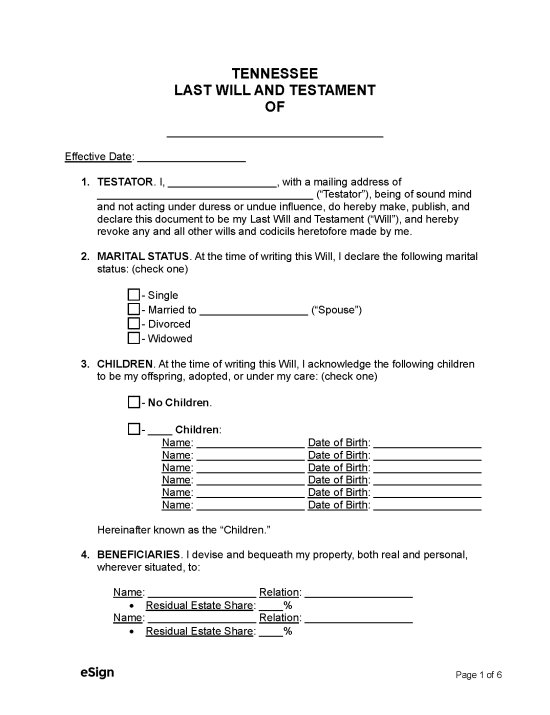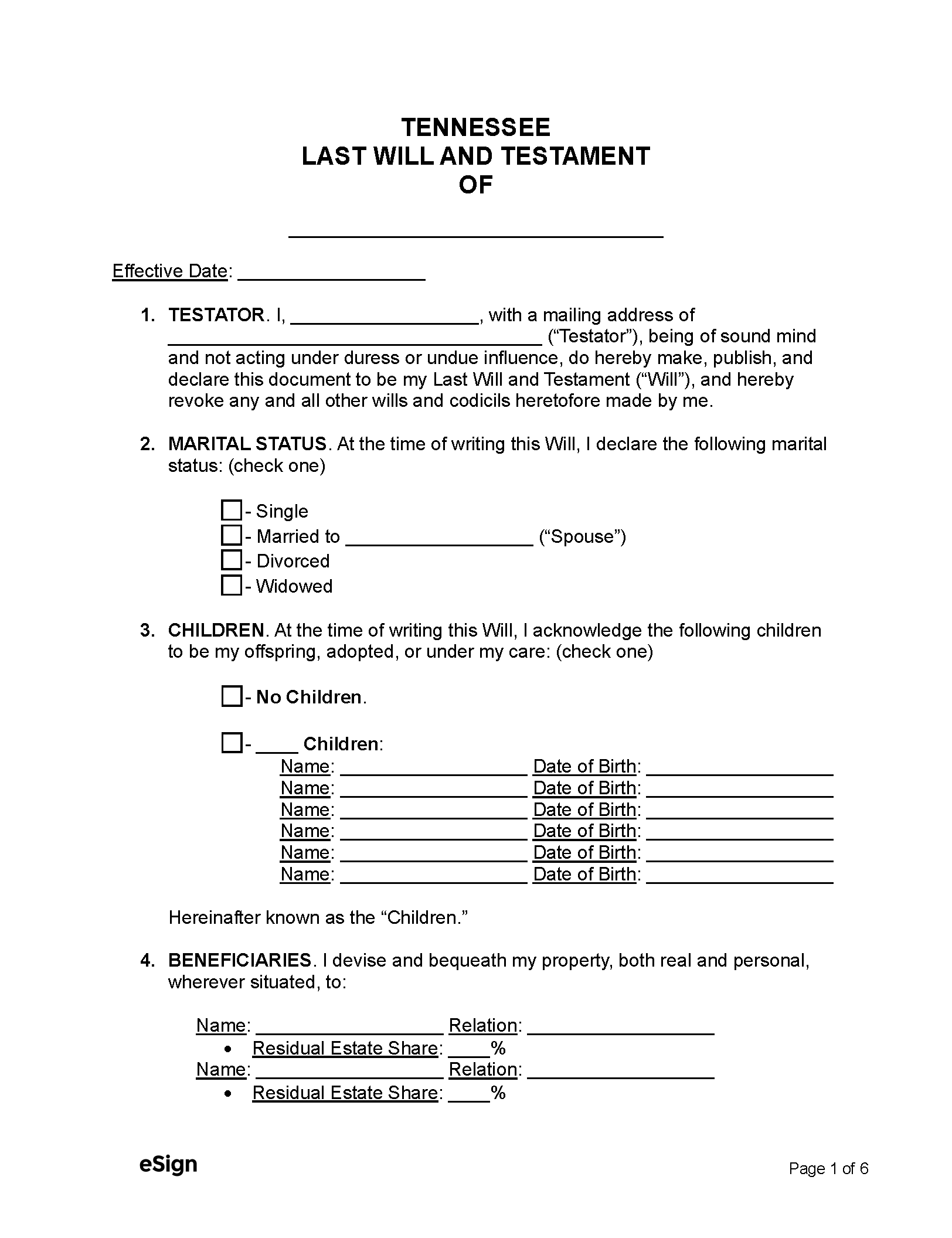State Laws
Any individual of sound mind eighteen years of age or older can make a last will and testament.[1]
Holographic Wills – Holographic wills are valid in Tennessee as long as the content and signature are in the testator’s handwriting and the handwriting is proved by two witnesses.[2]
Revocation – A will can be revoked through one of the following methods[3]:
- The creation of a subsequent will
- The execution of a revocation document
- The destruction of the original will with the intent of revocation
- Marrying a new spouse and having a child
Signing Requirements – A will must be signed by the testator and two witnesses.[4]
Probate Process in Tennessee (9 steps)
Petitions for the probate of a will should generally be filed within ten years of a decedent’s death.[5] A typical probate process can be accomplished in under 15 months.[6]
- Common vs. Solemn Form Probate
- File Petition
- Probate Bond (If Applicable)
- Order Granted
- Notice of Probate
- Exempt Property and Allowances
- Inventory
- Taxes, Debts, and Distribution
- Closing the Estate
1. Common vs. Solemn Form Probate
If the estate assets are valued at $50,000 or less, the beneficiaries of a will might be able to inherit assets from the estate using an Affidavit as to Small Estate instead of going through probate.[7]
Tennessee offers two methods for probating a will: common form probate and solemn form probate. In most cases, a will can be admitted to probate using the common form. This is an uncontested method where the will is presented to the court and, once proved valid, entered into probate.
Solemn Form Probate is reserved for situations where the executor believes an interested party may raise an objection. By filing through Solemn Form, they can force the objector to file within a certain timeframe.[8] The steps below follow the common form probate process only.
2. File Petition
To commence the probate proceedings, the executor named in the decedent’s will can file a Petition (sample form) with the probate division of the county where the decedent resided at the time of death.[9][10] Depending on the county, the probate division may be under the jurisdiction of the circuit court or the chancery court.
A copy of the will must be filed at the same time as the Petition. The will may need to be proved by having one of the witnesses sign an affidavit unless one was signed at the time of executing the will.[11][12]
3. Probate Bond (If Applicable)
A probate (or executor) bond is a form of guarantee made by the executor to protect the estate from mismanagement or improper distribution. Probate courts in Tennessee generally require an Estate Corporate Surety Bond to be executed before a personal representative is appointed. Typically, the amount is not less than the total value of the estate but not more than double.[13]
The court may not require the bond requirement if the will specifically waives it or if each beneficiary files a Consent to Serve Without Bond.
4. Order Granted
If there are no issues with the above documents, the judge will grant an order for the will to be probated and the executor to be appointed.
The clerk will have the executor sign a Personal Representative Oath affirming that the information provided is accurate, that they are qualified to serve, and that they will perform their duties properly.[14]
Once the oath is taken, the clerk will issue Letters Testamentary to the executor to give them legal authority to manage the estate.
5. Notice of Probate
Within 60 days of their appointment, the executor must send a copy of the will to each beneficiary. Within the same time period, they must send a Request and Release Form to the Division of TennCare along with the death certificate. This form may not be required if the decedent was under the age of 55.[15] Affidavits of both these notices must be filed with the court affirming they were sent.
The court clerk is responsible for publishing a Notice to Creditors within 30 days of the executor’s appointment once a week for two weeks in a county newspaper.[16] The executor must send this published notice to any known creditors.
Claims against the estate must be made within 4 months of the date of the first publication or 12 months after the decedent’s death, whichever is earlier. The executor must pay all valid claims within 90 days after 5 months have passed since the notice to creditors.[17][18]
6. Exempt Property and Allowances
The following distributions must be made by the executor if the decedent left a surviving spouse or minor children:
Exempt Property: The decedent’s surviving spouse (or minor children if no spouse) is entitled to the decedent’s personal property or vehicles in the value of $50,000 or less. These assets are distributed by the executor and are not subject to claims against the estate.[19]
Year’s Support Allowance: The surviving spouse is entitled to money from the estate for living expenses (or personal property of the same value) for one year following the decedent’s death. The court may decide that this allowance will be split between the spouse and minor children; if there is no spouse, the minor children receive the entirety.[20]
Homestead: The homestead of the decedent will pass on to their surviving spouse barring any prenuptial agreements, conversion to cash by court order, or other legal barrier.[21]
Elective Share: The surviving spouse can file a petition to claim a percentage of the decedent’s estate based on the number of years married instead of the amount proposed in the will. The amount is calculated by taking the total value of the estate minus exempt property, year’s support allowance, homestead, funeral expenses, administration costs, secured debts, and assets that automatically pass on to the spouse.[22]
7. Inventory
The executor must complete an Estate Inventory of all assets within 60 days of the will being accepted to probate. The Inventory must be filed with the court clerk and verified by the executor’s oath. A copy must also be sent to each beneficiary named in the will and an affidavit filed to prove delivery.
It is possible that an inventory would not need to be filed if there is a provision in the will waiving the requirement or all beneficiaries file a Waiver of Inventory.
8. Taxes, Debts, and Distribution
Once the inventory has been filed (or waived) and all allowances have been paid to the surviving spouse, if applicable, the executor can settle any debts and taxes. While Tennessee does not implement inheritance or estate tax for deaths after 2016, the estate may be subject to federal estate tax. If the value of all assets is over the federal taxable estate threshold, a US Estate Tax Return may need to be filed.[23]
If the executor plans on closing the estate by filing a Statement in Lieu of Final Accounting, they can distribute the assets to the named beneficiaries according to the decedent’s will. If the estate will be closed using a Detailed Final Accounting, the assets will be distributed at a later date.
9. Closing the Estate
There are two methods for closing an estate: Statement in Lieu of Final Accounting or Detailed Final Accounting.
Statement in Lieu of Final Accounting
The quickest and simplest method of ending probate is to complete a Statement in Lieu of Final Accounting. In order to close an estate this way, the estate has to meet the following requirements:
- All portions of the estate have been distributed.
- None of the beneficiaries are minors or incompetents.
- All of the beneficiaries acknowledge that the estate has been properly disbursed.
Each beneficiary must sign a Distributee Statement, and the executor must complete a Personal Representative Statement. The executor must file these documents along with an Order to Close Without Detailed Accounting. If approved, the judge will grant the order to close the estate and relieve the executor of their appointment.
Detailed Final Accounting
If any one of the requirements listed above is not met, the estate can only be closed by completing a Detailed Final Accounting. The executor must choose a filing date where the court will review the account. Interested parties must receive a copy of all accounting documents along with the Notice of Date to Submit Final Accounting at least five days prior to the chosen filing date.
This packet should be sent to each beneficiary within five days of the filing date, which date is chosen by the executor on any day and time the court is open.[24]
On the selected date, the executor can file the accounting packet along with the release form received from TennCare. The court will take a minimum of 30 days to review the final settlement to give interested parties the chance to object to the accounting or distribution.
After a judge reviews the settlement, and no objections or other issues arise, they will order it approved and the executor the executor can distribute the remaining assets to the beneficiaries in accordance with the testator’s wishes.[25][26]
Sources
- § 32-1-102
- § 32-1-105
- § 32-1-201
- § 32-1-104
- § 30-1-110
- Shelby County Rules of Court
- Title 30, Chapter 4
- Tennessee Probate Guide
- § 32-2-101
- § 30-1-117
- § 32-2-104
- § 32-1-110
- § 30-1-201
- § 30-1-111
- § 30-2-301(b)
- § 30-2-306
- § 30-2-319
- § 30-2-314
- § 30-2-101
- § 30-2-102
- § 31-1-104
- § 31-4-101
- Federal Taxable Estate Threshold
- § 30-2-603
- § 30-2-607
- § 30-2-701

